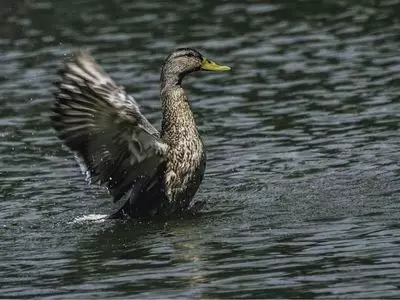No products in the cart.
Ducks
Why is My Duck Shivering? (WHAT IT MEANS)
What does it mean when a duck shakes?
Whether they’re excited, wet, ill, or just shaking feathers for the females, there is a reason behind your ducks shivering.
You should always make sure you know what’s going on with your ducks especially if you notice any sort of odd behavior.
Let’s learn more about why your ducks might be shivering.
*This post may have affiliate links, which means I may receive commissions if you choose to purchase through links I provide (at no extra cost to you). As an Amazon Associate I earn from qualifying purchases. Please read my disclaimer for additional details.
Why is My Duck Shivering?

After a swim, ducks may shake their wings and quack to shake the water from their feathers.
It might also have something to do with their mating rituals or if they’re happy or excited.
As a duck owner, you should investigate the possible causes of your duck shivering as this doesn’t always indicate something good.
Here are a few reasons that your duck might be shivering:
Mating Behavior
It could be part of a mating ritual.
A drake, or male duck, may shake its entire body, but especially its wings and tail when trying to attract a female.
The duck might also shake its wings and splash water.
So if you see this behavior follow, and it’s in the Spring or Summer, then it could be that the duck is shivering due to mating behavior.
Read our related article, Do Ducks Mate for Life? for more information on duck mating season and habits!
Excitement

If a duck is playing or excited, shivering will be accompanied by the wagging of its tail and the flapping of its wings.
You might also notice them gleefully hopping from one place to another.
This is a completely normal way of behaving as an excited duck, so if you notice your duck shivering because they are happy then this is a good thing!
Read our related article, Why Do Ducks Wag Their Tails? Tail wagging isn’t just a sign of excitement. Here’s what else it means!
Preen Gland Issues
The preen gland is responsible for coating the feathers with an oil that keeps them resistant to water.
It is possible, however, that problems with the preen gland will prevent the feathers from drying normally and this can make the duck cold.
The oil output can become excessive or possibly halt completely.
In this scenario, you should look out for if there is a perceptible change in the appearance of their feathers.
The feathers will likely appear mismatched, and if an infection has taken hold, you will likely detect a yellow hue towards the tail.
The quality of the feathers can be compromised if the gland becomes hyperactive.
This can make the feathers thin and then the ducks won’t have proper warmth when it comes to getting wet and drying off.
It’s important to feed your ducks a balanced diet so that they are keeping up with their preen gland health.
Inadequate nutrition in the duck’s diet can contribute to preen gland dysfunction alongside illnesses, parasites, and obstructions.
Ducks require vitamins B and E, specifically, for healthy preen gland activity.
Read More: How Long Can Ducks Stay Underwater? This article can give you a bit more information on how the preen gland works to keep ducks safe in the water.
Viral Hepatitis
A duck may shiver when they are infected with duck viral hepatitis, a disease that causes hepatomegaly (liver enlargement).
Young ducks, especially those younger than 1 month, are extremely vulnerable to and often die from viral hepatitis.
It can be deadly in a couple of hours and frequently is.
Consequently, if you can catch it early enough, keep the sick bird isolated from the flock.
After that, you should make an appointment with your vet right away.
Tremors (including shaking and shivering) and leg contractions are the most prominent signs.
Diarrhea, a lack of appetite, and nasal discharge are some more symptoms.
Read our related article, How to Help a Duck With a Hurt Leg, for more tips on what you can do to isolate and care for a sick duck.
An Infection Caused By Riemerella Anatipestifera
New Duck Disease, also known as Infectious Serositis, is a bacterial infection that spreads through the air or by cuts on the ducks’ feet.
The good news is that vaccines exist to protect your ducks against this illness.
One of the most prominent signs to keep an eye out for is trembling or shaking in the neck and head.
This shivering often occurs in one area of the body, however, it might spread.
Joints, oviducts, brains, meninges, and lungs are just some of the organs that might be impacted by this condition in your duck.
Get in touch with your vet if you notice these or any other symptoms, as the illness is treatable with medication.
Pneumonia
Aspergillosis, brooders pneumonia, fungal pneumonia, and mycotic pneumonia are all names for the same non-contagious respiratory disease that is caused by the fungus Aspergillus.
Ducks, chickens, and game birds are just a few of those who are susceptible to this illness.
Constant shivering is the primary symptom in this case, but there are other signs that may accompany this.
Here are a few signs to watch out for:
- Gasping for air
- Losing appetite
- Becoming dehydrated
- Fatigue or acting lethargic
Moldy bedding and feed are common sources of infectious spores that cause this disease.
If either of them becomes wet and stays wet, the chances of this happening increase dramatically.
Although not contagious from bird to bird, in severe situations it is best to keep the diseased bird separate from the healthy ones.
Fortunately, antifungal drugs can be used to treat the condition.
Inconveniently, the duration of treatment may be several weeks or even months.
If you have young children, the elderly, or a compromised immune system, it is best to have someone else take care of the sick ducks rather than handle them yourself.
Cleaning the ducks living space and ensuring everything is properly drying with proper ventilation can help to prevent their exposure to moldy spores.
Read our related article on How to Keep Duck Bedding Dry to help prevent this disease and others.
What to Do if Your Duck is Shivering

If you see the drakes shivering during mating season, there’s no need to worry.
You may have seen your domesticated duck shiver and wag its tail when it sees you first thing in the morning or when you get home from work.
This is completely motivated by joy and enthusiasm.
Consider the weather if your duck is shaking and shivering for no apparent reason.
You can check to see if your duck is shivering because of wet feathers if the weather is chilly.
See if the preen gland is enlarged and if the area around the tail is a yellowish hue. It’s likely an indicator that the gland is diseased; a vet examination is necessary to confirm the diagnosis.
The fact that your duck is shivering in the middle of a heat wave may indicate that it has caught an illness.
Isolate the shivering duck in a warm, dry place as soon as possible and call your vet so they can take a look at the bird.
Here’s a video showing what a shivering duck looks like so you know what to look for:
Conclusion
Ducks have been seen shivering at times which can be worrisome for some duck owners.
It’s important to know the possible causes of this behavior in ducks.
Following these tips and watching for these signs can help you indicate why your duck is shivering.
